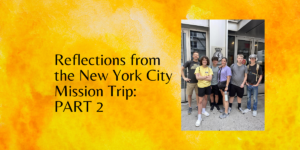March 5, 2017 – First Sunday in Lent
Proclaimer: Rev. Dennis W. Foust, PhD
Sermon Series: Seven Words for Every Day: Jesus’ Words from the Cross to Empower Us for Everyday Living
Sermon: Finding the Way to Forgiveness
Scripture: Luke 23:32-34
As a counselor, placed a tall and heavy stack of books on the library circulation desk, she was asked, “What are you doing with all those books?” “Research,” she replied. This prompted the question, “What are you working on?” The counselor replied, “Forgiveness.”
Aren’t we all working on forgiveness? Forgiveness is no stroll in the park. Finding your way to forgiveness is much more like a long hike in a deep forest with monsters, undergrowth and risks along the way. If forgiveness were easy, we would not have Good Friday.
Forgiveness is complicated and multilayered. Our North Carolina state tree, the pine tree, can live for 300 to 500 years. If you could see inside some of the oldest pine trees in our Old North State, you could count 300 to 500 rings. There are many layers to forgiveness as well.
Although forgiveness is complicated, nothing is as redeeming or transformational as is forgiveness between God and a person, between persons, in families or between groups and nations. The first word of Jesus on the cross was, “Father, forgive them, for they do not know what they do.” Jesus’ death on the cross was motivated by God’s forgiveness of our sin.
We become sisters and brothers in Christ’s Church because we respond to God’s forgiveness and we journey together finding our way as followers of Jesus, living out God’s forgiveness in the everyday relational life of this diverse and pluralistic world. In our St. John’s covenant, we state it this way: “Our differences will not separate us but rather increase our understanding and strengthen the bonds of Christian love.”
However, we must admit that, although Christ’s Church is founded upon God’s forgiveness, Christ’s Church has a loooooong history of failing to express the nature and character of Godly forgiveness – even to one another within the community of faith. Many Christian congregations have come into existence because of church fights and schisms resulting directly from a failure to forgive. Differences of perspective have led to hurt feelings which have given way to quarreling, bitterness and resentment resulting in some members of Redeemer Church by the Post Office to leave and begin a new church called Prince of Peace on Unity Road. You may know of a small town where two struggling churches of the same denomination contra-exist so that disgruntled ex-members of each church can pray with newfound enemies.
Consider three thoughts. (1) What is Godly forgiveness? (2) What happens when you find your way to Godly forgiveness? (3) Where does the pathway to Godly forgiveness begin?
- WHAT IS GODLY FORGIVENESS?
There is a tremendous difference between our human approach to forgiveness and Godly forgiveness. This is no surprise to you for you know what the prophet Isaiah pronounced more than twenty-seven centuries ago: “My thoughts are not your thoughts, nor are your ways my ways, says the Lord” (Isaiah 55:8).
Human forgiveness is often a shallow transaction initiated to erase conflict. It begins with the offender saying, “I am sorry. Please forgive me.” In human forgiveness, AFTER the apology by the offender to the offended, the offended then has the choice as to whether or not to forgive the offender. And, if the offended makes the choice of refusing to forgive, the human approach can find plenty of support defending their choice to stay offended.
However, Godly forgiveness is not like human forgiveness. In Jesus Christ, Godly forgiveness is sacrificial; both costly and initiating. Godly forgiveness does not begin after the apology or the confession or the repentance begins. Godly forgiveness precedes repentance. In fact, Jesus and Christian Scriptures even teach that Godly forgiveness inspires or motivates humble repentance, spiritual transformation and relational reconciliation. In Jesus’ parables and teachings, his listeners had a difficult time with him saying, “Forgive 70 times 7.” “Turn the other cheek.” “Love your enemies, do good to those who hate you; bless those who curse you; pray for those who mistreat you.” In 1 John 4, we find this foundational description of Godly forgiveness: “In this is love, not that we loved God but that God loved us and sent his Son to be the atoning sacrifice for our sins. Beloved, since God loved us so much, we also ought to love one another.”
In Christian theology, God is the offended party by our sin. We are the perpetrators of God’s pain and suffering. Jesus hangs on the cross, bleeding from his head, his hands and his feet crying out words of forgiveness to God. The original language in this passage does not merely have Jesus saying this phrase once. It suggests Jesus ‘was repeating’ these words over and over and over again: “Father, forgive them for they do not know what they are doing. Father, forgive them for they do not know what they are doing. Father, forgive them for they do not know what they are doing. Father, forgive them for they do not know what they are doing” Jesus was aware of our ignorance and still prayed for our forgiveness.
Of course, we want to make this phrase apply only about those soldiers or the Sanhedrin or Pilate or the crowd mocking Jesus at Golgotha that afternoon. Yet, we know we were also there and are also guilty of not knowing what we are doing. We must become less ignorant and uninformed about what we are doing. As followers of Jesus, we must become more mature about why we are here and what we are doing while we are doing what we are doing.
GODLY FORGIVENESS BESTOWS THE BLESSING OF FORGIVENESS PRIOR TO AN APOLOGY. GODLY FORGIVENESS IS WHAT THEOLOGIANS CALL CRUCIFORM. GODLY FORGIVENESS TAKES ON THE FORM OF JESUS’ CRUCIFIXION. GODLY FORGIVENESS IS SACRIFICIAL INVITING THE OFFENDER INTO A RECONCILED RELATIONSHIP OF LOVE, GRACE, MERCY, PEACE AND HOPE.
2. WHAT HAPPENS WHEN YOU FIND YOUR WAY TO GODLY FORGIVENESS?
This past week, I asked some St. Johnsians to offer their thoughts about forgiveness. These members offer some good thoughts for you to consider.
- “Forgiveness can be so difficult because it often requires you to set aside your pride and self interest in order to let those negative emotions go. But in the end it is always necessary to forgive for your own mental health and happiness and for the good of your relationships and your family. Holding onto a grudge or harboring ill will can eat you alive.”
- “Knowing you need forgiveness requires you fess up to your transgressions. I’m not sure many of us do this. We are much better at making excuses. We should just say, ‘I’d like to explain my weaknesses to you, but, at the end of the day, it was my lack of character, thoughtfulness, or integrity that allowed me to wrong you. I did this and it hurt you and I’m sorry.’ Who wants to say that? Not me! I think God’s forgiveness is ‘understanding.’ God says, ‘I know your weaknesses and the lies you tell yourself. Yet, I know your real motives and my intimate knowledge of you is motivated by my love for you. So, I forgive you…which is not to be confused with permission.
- “Who do you help the most by forgiving someone that has offended or betrayed you? Yourself! The ability to forgive is something that shows ones’ ability to love. To truly forgive, you must also forget…….I struggle most with this one!”
- “Forgiveness can be difficult to give sometimes, but after the weight of a grudge has been lifted from my heart, to me there is no better feeling. Asking for forgiveness provides me with a release of the anxiety and doubt that comes with a regrettable act. When given, I feel like I’ve been given a fresh start. In both cases, either forgiving or being forgiven, I feel like a friendship or relationship has been born again.”
Beloved, we live in a world where the repetitive cycle of retribution prowls non-stop. Anger, meanness, grudge-holding, fault-finding, focusing on our differences, clinging to our pain and just plain old stupid pride control the headlines. Yet, as Desmond Tutu said, “There is no future without forgiveness.” Forgiveness shows whether we take Jesus seriously or not. When you find your way to Godly forgiveness,
- you open your life to co-creating, with God, new possibilities for a new community.
- you embrace God’s forgiveness that both reconciles you with God as it also redeems you and empowers you to become a reconciler in the spirit of Jesus Christ.
- you begin to heal a wound in the human community.
- you labor in the Kingdom of God for reconciliation and peace-building in our world.
When Jesus invites you to “Come unto me and learn of me…,” he knows you are burdened down with guilt, grudges, pain, wounds, shame and damaged or broken relationships. Jesus wants you to find your way to Godly forgiveness – for your sake and for the world’s sake. Jesus offers to you a word from the cross to empower you for everyday living: “Father, forgive them for they do not know what they are doing.”
3. WHERE DOES THE PATHWAY TO GODLY FORGIVENESS BEGIN?
The pathway to Godly forgiveness begins somewhere along that road that runs between your head and your heart. This is the most difficult journey some people ever take.
Look inside the pages of your travel journal for any hint of guilt or shame or for the face of anyone who has offended you and you have not forgiven them. Mark that page; for you will begin to find your maturity in Godly forgiveness right there. Amen & AMEN!
Welcome to the Lord’s Table. Jesus invites you with these words, ‘Remember me.’
Amen & AMEN!









